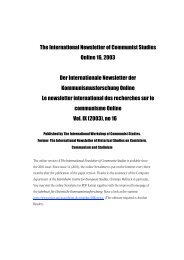VOL. XVI (2010), NO 23 - The International Newsletter of Communist ...
VOL. XVI (2010), NO 23 - The International Newsletter of Communist ...
VOL. XVI (2010), NO 23 - The International Newsletter of Communist ...
Sie wollen auch ein ePaper? Erhöhen Sie die Reichweite Ihrer Titel.
YUMPU macht aus Druck-PDFs automatisch weboptimierte ePaper, die Google liebt.
<strong>The</strong> <strong>International</strong> <strong>Newsletter</strong> <strong>of</strong> <strong>Communist</strong> Studies Online <strong>XVI</strong> (<strong>2010</strong>), no. <strong>23</strong> 30<br />
Lev Centrih, University <strong>of</strong> Ljubljana (Slovenia):<br />
Science, Philosophy and Ideology in Slovenia 1941-1945. PhD Project. 1<br />
<strong>The</strong> aim <strong>of</strong> my PhD research project is to elucidate the production <strong>of</strong> knowledge during the<br />
period <strong>of</strong> the Yugoslav revolution, a topic which has been traditionally either neglected or<br />
elaborated in an oversimplified manner. <strong>The</strong> latter is true for earlier Slovene (Yugoslav)<br />
historiography <strong>of</strong> national liberation struggle starting back in early 1960s, and, as one might<br />
argue, for the most important part <strong>of</strong> current elaborations as well, with two notable<br />
exceptions, both <strong>of</strong> them in the fields <strong>of</strong> literature and art history: “<strong>The</strong> History <strong>of</strong> Slovenian<br />
Literature, Literature during the War Years 1941-1945”, written in the early 1970s by Viktor<br />
Smolej, 2 and a recent in-depth study by Miklavž Komelj, entitled “How to Imagine Partisan<br />
Art”. 3 Smolej noticed that the cultural activities during the war years in Slovenia barley<br />
introduced anything new in realm <strong>of</strong> literary genres, irreversible change might be detected<br />
only in its new conditions <strong>of</strong> existence. By saying so, Smolej implicitly outlined the possibility<br />
to elaborate cultural artifacts as products <strong>of</strong> distinguished social apparatus and by doing so,<br />
he made an important step toward a materialist theory <strong>of</strong> art-ideology-politics relations; in a<br />
materialist analysis cultural activities must be elaborated as a distinguished type <strong>of</strong> social<br />
production, as Pierre Macherey argued in the late 1960s. Miklavž Komelj on his part argues<br />
that partisan art is understandable only as a radical break with the understanding <strong>of</strong> art itself.<br />
For the most part however, in the mainstream <strong>of</strong> historiography the subject in question has<br />
been limited by topics, such as political ideas, programs and ideologies <strong>of</strong> political parties<br />
and groups involved in social struggles or singular cultural enterprises; the role <strong>of</strong> ideas –<br />
political doctrines and works <strong>of</strong> art has been usually identified as something secondary, even<br />
obscure comparing with major war events and struggles for political power or the<br />
establishment <strong>of</strong> new political institutions. Ideas, usually synonymous for ideologies are<br />
therefore considered as some sort <strong>of</strong> propriety <strong>of</strong> distinguished political groups or<br />
(international) movements, whereas people obtain object status <strong>of</strong> those ideas.<br />
Three main current approaches toward the set <strong>of</strong> problems in question still maintain<br />
hegemony in Slovenian scholarship as well as in mainstream public discussions. Firstly, it is<br />
right-wing nationalist historical revisionism. Its enterprise is to build a historical narrative on<br />
three basically equal totalitarianisms – fascism, Nazism and communism, but in reality it<br />
focuses exclusively on “bolshevism”. <strong>The</strong> “Slovenian totalitarism school” has also a dissident<br />
subgroup, introducing a fourth totalitarianism – clericalism (“clero-fascism”). Secondly, we<br />
have objectivism – refuting totalitarianism as analytical point <strong>of</strong> departure and focusing on<br />
pure narration in old Ranke style (“Was eigentlich geschehen ist”). Finally, there is<br />
victimology: focusing on dissidents, middle groups and neglected or repressed individuals,<br />
building historical narrative by taking their views at face value. My PhD project starts with<br />
criticism <strong>of</strong> these approaches through developing a new concept: “zoo-keeping”. It stands for<br />
the common practice to reduce distinguished individuals – theoreticians and revolutionaries<br />
like Edvard Kardelj – as a data bank in order to satisfy the objectivist criteria in mainstream<br />
historiography which is still predominant in Slovenia when it comes to analyzing WW2 and<br />
the revolutionary period. As a result, Kardelj’s works never meet deep theoretical analysis.<br />
By doing so, i.e. describing his political roles, using data from his works, making use <strong>of</strong> his<br />
1 Under the direction <strong>of</strong> Pr<strong>of</strong>. Rastko Močnik, University <strong>of</strong> Ljubljana and Dr. Peter Klepec Kršić, Scientific Research<br />
Centre <strong>of</strong> the Slovenian Academy <strong>of</strong> Sciencies and Arts.<br />
2 Viktor Smolej: Zgodovina slovenskega slovstva. VII: Slovstvo v letih vojne 1941-1945, Ljubljana, Izd. in Založila<br />
Slovenska Matica, 1971.<br />
3 Miklavž Komelj: Kako misliti partizansko umetnost?, Ljubljana, Založba *cf, 2009.














